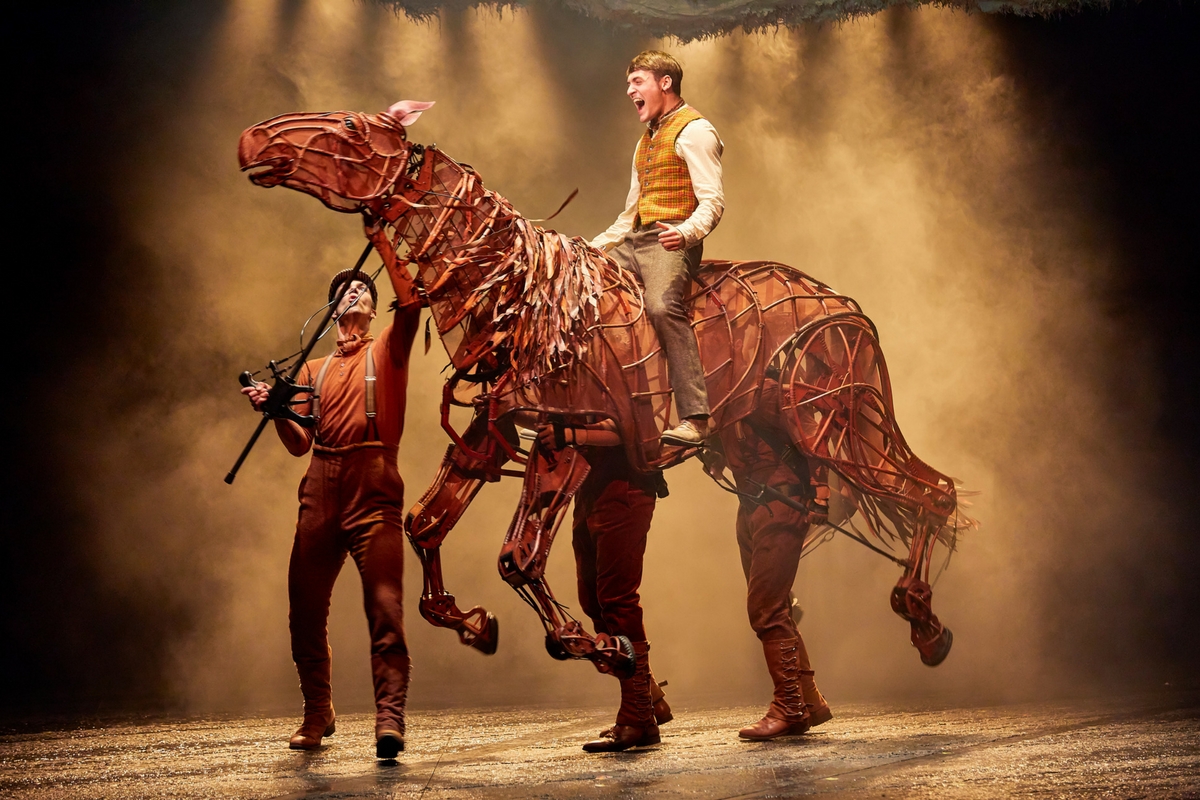Another of the unstoppable theatrical phenomena that fetches up at the Festival Theatre from time to time on a sea of merchandise, awards and multi-starred reviews, War Horse‘s merits are well known. This story of Albert, a young Devon farm lad who follows his beloved horse across the Channel to the trenches of the First World War features life-size animal puppetry of such intricacy and detail, the play recommends itself on that alone.
And truly, Handspring Puppet Company‘s work is incredible. Not just the horses (of which there are many) either. Crows, geese and songbirds are brought beautifully to life with a romanticism and playfulness to warm the coldest of hearts.
The horses are the main draw, of course. Yes, every so often they slip into an equine uncanny valley, the leg mechanics almost perfect but for a tiny lack of grace. Then the ears twitch as if with real nerves and disbelief is completely suspended again. There are moments, especially when the horse is upstage, dry ice rising like meadow mist with the lighting just so, when you could watching a future Derby winner on Newmarket Heath.
That is this play’s glorious triumph.
This artistry, however, is masking what turns out to be quite a thin story, like Farrow & Ball over plywood. It is everything from every First World War film ever. It’s letters home to mum, it’s photos of sweethearts, it’s realising that Fritz and Tommy are just the same underneath. It’s “do… you… speak… English?” for comedy and then “damn this war” for pathos, or an attempt at it. We’ve seen this picture a hundred times before and “damn this war” is no longer a convincing way to convey trench brutality, even in what is essentially a children’s story. Even the boy-and-animal bonding story feels over-familiar, done many times and done better (thanks Kes). The Michael Morpurgo book on which the play is based dates from 1982, and the mores of that era have carried through. There’s a Chariots of Fire sentimentality to it that has an obvious, marketable appeal, but it would have to work a lot harder to provide profound drama.
It doesn’t help that scenes hang around long after their point has been achieved. In Act One, Albert (Thomas Dennis) spends an awful lot of time training Joey the horse, giving us ample time to marvel at the puppetry, but with little narrative effect. At two hours forty minutes, War Horse is long, and could easily be curtailed.
The cast, it feels odd to say, remain largely anonymous, overshadowed literally and metaphorically by the equine stars. Dennis does all he needs to as Albert. Jasper William Cartwright injects some much-needed personality into proceedings as cousin Billy, even if his shell-shock scene is a little ropey, and Jo Castleton makes a good Devonian mother figure. Elsewhere though, there’s some questionable country and German accents and unspectacular emotional scenes. It’s fairly perfunctory for this level.
In any case, for the most stirring moments, no speaking actors are on stage. It may only be a subsidiary theme of the play, but the savage futility of sending perishable flesh to meet cold, hard metal makes scenes like Joey tangling in barbed wire or rearing against a WWI tank especially vivid. It was a cruel accident of history that meant organic solutions like the horse were still a feature of the battlefield as war turned industrial. Excellent choreography makes the reality of that plain.
And then BANG! There’s a lot of heart-stopping noises in War Horse. The rip-in-the-sky that acts as a backdrop gets painted red with blood or black with mud and flying bodies. That works well, but all that noise is deliberately and unpleasantly loud. Were this a play that wanted to immerse us fully, first-person, in a battlefield sensory overload, then fair enough, this War Horse would be a different beast entirely, but as it stands, the switch from sentimentality to white noise is simply jarring.
Besides, it is not the horrors of war that live with you after this, but the nobility of the horses. At points, Paule Constable’s lighting design leaves them perfectly poised, as beautiful and untouchable as sports cars in a showroom. You can’t blame people for falling for them or for the sentimental storyline. There are deeper, more affecting things to say about the Great War though, even 100 years on.
